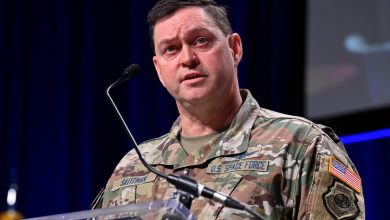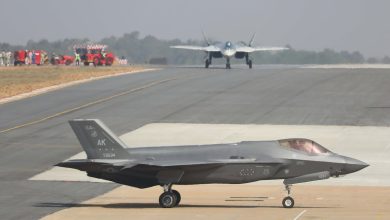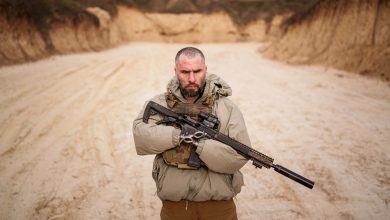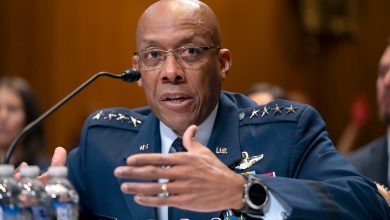Air Force secretary: Elon Musk ‘not a warfighter,’ needs to learn more

Outgoing Air Force Secretary Frank Kendall on Thursday downplayed Elon Musk’s recent pronouncements that crewed fighters are obsolete in the era of drones, and suggested the billionaire industrialist learn more about the military.
“I have a lot of respect for Elon Musk as an engineer,” Kendall said during a webcast with the Mitchell Institute for Aerospace Studies. “He’s not a warfighter, and he needs to learn a little bit more about the business, I think, before he makes such grand announcements as he did.”
In November, Musk wrote that “manned fighter jets are obsolete in the age of drones” and called those building jets like the F-35 “idiots” in a series of posts on his social media platform X.
SpaceX founder and billionaire Musk allied himself with President-elect Donald Trump this year, and has become a key confidant to the incoming president with growing influence. Trump named Musk, along with entrepreneur Vivek Ramaswamy, to run a task force dubbed Department of Government Efficiency to examine ways to slash federal spending.
Musk made multiple scathing posts Wednesday about a proposed continuing resolution bill funding the government for three months that Congress was set to vote on, and his stance was soon echoed by Trump. This prompted Republican lawmakers to reject the CR, throwing the funding process into uncertainty and raising the specter of a government shutdown over Christmas.
Musk’s dig at crewed fighter jets isn’t the first time he’s ruffled Air Force feathers over the topic. In 2020, he appeared at an Air Force Association conference and declared, “The fighter jet era has passed.”
But while Musk’s star may be rising in the new Trump administration, Kendall said Musk’s idea of a drone Air Force that can take the place of the current crewed fleet is still years away from having the necessary technology to work.
“It’s provocative, it’s interesting,” Kendall said. “I can imagine at some point — I don’t think it’s centuries, by the way, I think it’s more like decades when something like he imagines can occur. But we’re not there, and it’s going to be a little while before we get there.”
The Air Force is rapidly moving toward adopting autonomous drone wingmen known as collaborative combat aircraft, or CCAs, which would pair with F-35A fighters and, possibly, the service’s future Next Generation Air Dominance fighter.
Kendall said CCAs show the growing importance uncrewed platforms are playing in the Air Force’s arsenal but that crewed fighters can’t be abandoned yet. When the Air Force flies CCAs into battle, he said, it will be important to have a human battle manager nearby to control them as a unit, with a highly secure communications feed.
Pilots in simulators are already starting to learn how to manage large numbers of CCAs while continuing to operate their own jet, Kendall said — and are enthusiastic about the new possibilities and new ways to safely accomplish their missions CCAs will provide.
“My vision … is that our operators are going to embrace this, they’re going to move it forward and they’re going to deploy it in a cost-effective way,” Kendall said. “I was a little unsure as to how our operators would react to this, but when I asked them the question, ‘How do you feel about this,’ they say, ‘Sir, these are going to keep us alive.’”
Kendall said the military should continue to buy the F-35, which he called a “state-of-the-art system that’s continuously being upgraded,” and in high demand from allied militaries around the world. The Air Force plans to buy 1,763 F-35s, but Kendall said the final number could change depending on how well CCAs and NGAD work out.
Stephen Losey is the air warfare reporter for Defense News. He previously covered leadership and personnel issues at Air Force Times, and the Pentagon, special operations and air warfare at Military.com. He has traveled to the Middle East to cover U.S. Air Force operations.
Read the full article here






